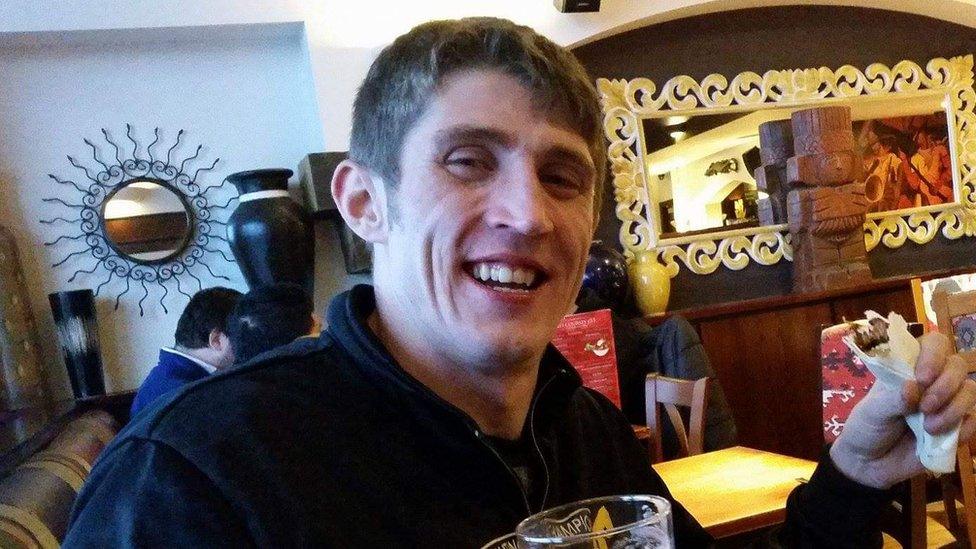Allan Marshall family demand action over prison struggle death
- Published

A sheriff ruled Allan Marshall's death was "entirely preventable"
The family of a man who died after being restrained by prison staff have called for action to be taken against them.
Allan Marshall suffered a cardiac arrest during a protracted struggle, leading to fatal brain damage in 2015.
A fatal accident inquiry, external ruling published this month concluded his death was "entirely preventable".
The Scottish Prison Service has offered to meet the family to discuss their concerns.
The family said officers involved were given immunity from prosecution in return for agreeing to giving evidence to the inquiry.
But his aunt, Sharon MacFadyen, said they should be held to account for a catalogue of errors that emerged during the hearing.
She said: "They should be punished for what they did because they know what they did.
"They know it wasn't normal. They had no duty of care towards Allan so if there's no duty of care to other prisoners, are they safe in prison? I would like to see them losing their jobs because to me they were incompetent."
'Penalty shoot-out'
Allan Marshall, from Carluke, South Lanarkshire, had been on remand at HMP Edinburgh for almost a month in March 2015 following an incident outside a nightclub.
A fellow prisoner described him behaving strangely in the days before the fateful struggle, reciting scripture and showing signs of being delusional.
In the early hours of 24 March, officers said Mr Marshall became agitated, smashing up his cell.

Allan Marshall may have been suffering a psychotic episode prior to his death
He was transferred to the jail's segregation unit where he agreed to take a shower - but instead sat behind the shower door reciting hymns or chants and exhibiting "strange behaviour".
When officers tried to remove him, a violent struggle broke during which one prison officer sustained a broken wrist and two others were bitten.
Officers described Mr Marshall as exhibiting apparently "superhuman" strength and being oblivious to pain even though he was himself injured.
More officers were called and Mr Marshall was eventually overpowered.
He was then dragged face down, by his feet into a corridor where CCTV showed him being pinned down by five prison officers. One was seen repeatedly using his feet to restrain the prisoner.
Plastic handcuffs were fitted to Mr Marshall but it was noticed he had become limp. After some delay, a "code blue" alert summoning medical staff was issued..
A nurse who attended described seeing up to 20 prison officers standing shoulder to shoulder like a "penalty shoot-out". No-one had started CPR even though some of those present were first aid trained.
After CPR was begun, a pulse was eventually detected but Mr Marshall died in hospital four days later after a scan showed he had suffered irreversible brain damage due to oxygen starvation.
'Excited Delirium Syndrome'
A forensic pathologist found Mr Marshall had an underlying heart condition which may have contributed to his death.
However, he said the face-down restraint may have also been a factor - along with the psychological shock of the struggle.
The FAI found that Mr Marshall's strange behaviour and other physical symptoms suggested he was experiencing Excited Delirium Syndrome - a condition linked to drug use or mental illness - which can lead to violence and unexpected strength.
The sheriff said there were many missed opportunities to seek the help of healthcare staff and take a different approach to Mr Marshall's behaviour.
"I am satisfied that the evidence which has been led in this inquiry amply demonstrates that Mr Marshall's death was entirely preventable," he concluded.
He said it was "clear that prison officer staff did not tell the whole truth on a number of occasions. Sometimes they appeared to be mutually and consistently dishonest."
The sheriff also criticised the prison service as "unhelpful" when it came to making available training manuals and information about approved restraint techniques.

Sharon MacFadyen doubts if the family will ever know the full facts
Sharon MacFadyen said the family had been shocked by what had emerged from the FAI.
She said: "It's upsetting that it could have been prevented but we knew that from the start.
"There's still a lot of questions to be asked. And I don't think we'll ever get the truth."
The Scottish Prison service said it was happy to meet the Marshall family and has been in touch with their legal representatives
A spokesman added: "The SPS will do what we can to address any issues they want to raise with us."
A Crown Office and Procurator Fiscal Service spokesman said: "After consideration of the circumstances of this case, Crown counsel concluded there should not be criminal proceedings and that a fatal accident inquiry should be held.
"The purpose of an FAI is to prevent future deaths or injuries and not to establish criminal or civil liability. The reasons supporting this decision were explained to the family through their solicitor."